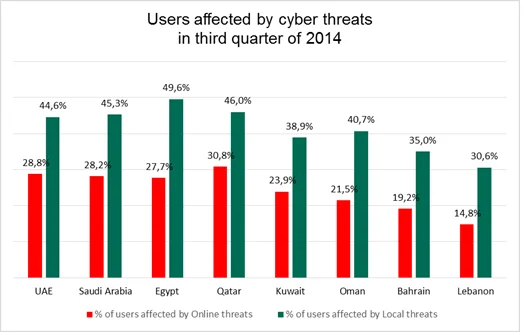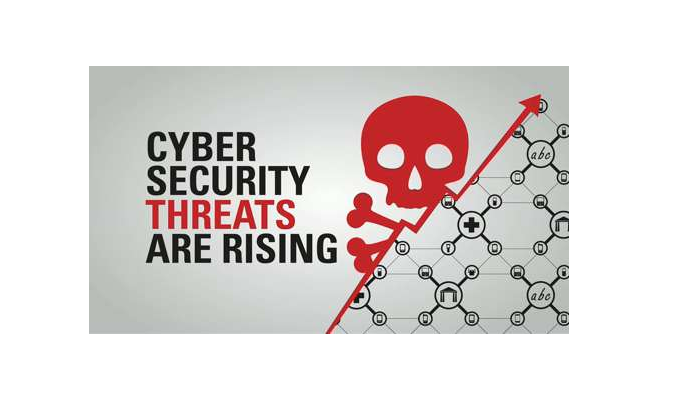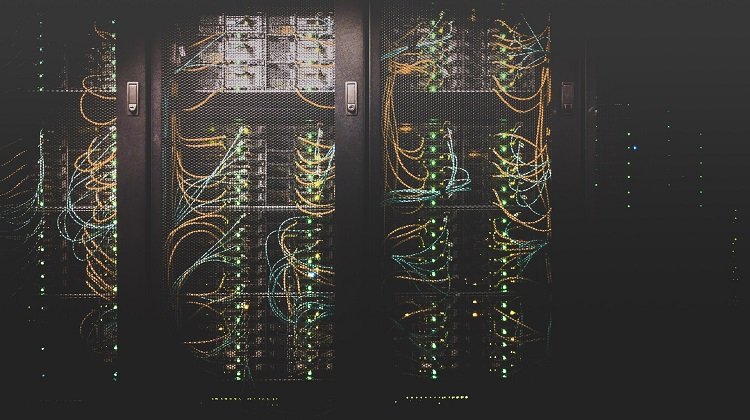During GITEX Technology Week that takes place on October 12-16 in Dubai, Kaspersky Lab presented the latest changes and statistics for Middle East threat landscape from the third quarter of 2014. Based on data from Kaspersky Security Network, on average every second user in the region comes across local threats (malware spread in local networks, by USBs, CDs, DVDs), and every fourth user faces online threats associated with the Internet. The number of users facing local and web threats has increased by several percentage points compared with the same period in 2013.
From July to September 2014 Kaspersky Lab products in the Middle East neutralized more than 59.2 Million cyber-attacks and malware infections on computers and mobile devices, representing an increase of almost 13.6% year-on-year (the Q3 2013 figure was 51.1 million). More than 7.6 million of these came from the Internet, while the remainder were blocked when they came from local sources such as USB drives, DVDs etc.
The company also registered a rise in the number of mobile threats and attacks that aim to steal users’ banking credentials. The number of mobile infections reported during Q3 2014 was 3.5 times higher than the figure for the same period in 2013. The number of Banking Trojan incidents recorded during Q3 2014 doubled compared with the previous year.
KSN statistics for July-September 2014 show that the highest numbers of local and web threat incidents were reported in the UAE and Saudi Arabia, followed by Egypt. Egypt continues have the highest number of users affected by local threats – 49.6%, up from 47.8% a year earlier. Qatar still has the highest web threat level with 30.8% of users facing threats while online (29.3% a year ago). Bahrain and Lebanon have one of the lowest threat levels in Middle East for both online and local threats.

“The cyberspace trends that we mentioned before continue to develop in the region: we’re seeing the spread of politically-oriented malware, an increase in the amount and sophistication of financial fraud, Crypto Ransomware, DDoS and other targeted attacks on companies. Meanwhile threats related to local networks, removable devices and the Internet are also there and spreading. Any of these threats can cost time, data and money. So companies and home users should be aware of the risks and protect their computers and mobile devices by using comprehensive security solutions and following sensible security guidelines,” said Ghareeb Saad, Senior Security Researcher at Kaspersky Lab.
To avoid these cyber risks, companies need an effective and easy to manage security solution, such as Kaspersky Endpoint Security for Business that can cover all possible risks within their IT perimeter, and implement good security policies that employees understand and follow.
Consumers should also have comprehensive security software, for example, Kaspersky Internet Security – multi-device. Installing an effective security solution, especially if a device is used to make online payments, use social networks or other activities involving personal information, can reassure users that they have the protection they require to avoid being infected by the threats mentioned above. They also should follow sensible security guidelines such as:
- Using different complex passwords for different accounts and services. Solutions like Kaspersky Password Manager make this easier by generating secure passwords and making the process of entering them into web pages completely automated,
- avoiding clicking on suspicious links and downloading or opening attachments received from untrusted sources,
- Double-checking webpage URLs before entering credentials or confidential information. Phishing sites are carefully designed to look authentic,
- Using secure https connections with valid SSL Certificates (an expanded standard http protocol which supports encryption – Hypertext Transfer Protocol Secure) while entering credentials.
- Using only legal software and updating software regularly – it can guarantee stable PC performance and keep data safe.
You can see Kaspersky Lab’s real-time cyber threats map. To check your computer for malware you can use the free Kaspersky Security Scan. Kaspersky Lab experts are available at GITEX at Stand A1-11 in Hall 1 (Network & Security).








